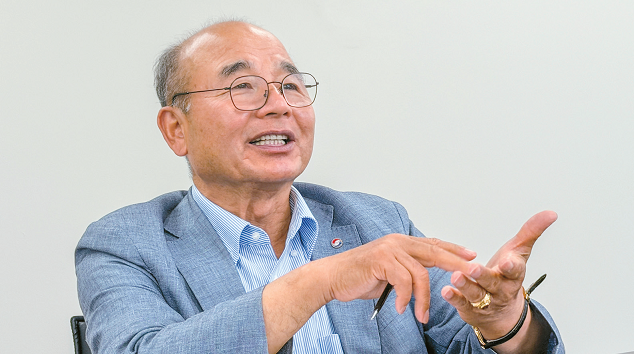Jeong Seung-jo, former chairman of the Republic of Korea Joint Chiefs of Staff, is widely regarded as one of South Korea’s foremost military strategists. Over a 38-year career, he held key posts including policy planning director at the Ministry of National Defense, deputy commander of the ROK–U.S. Combined Forces Command, and later became the nation’s top-ranking officer under the Lee Myung-bak administration.

Currently visiting the U.S. to attend the U.S.–Korea Alliance Conference in San Diego (October 24–25), Jeong spoke on October 22 about the state of the alliance, the North Korean threat, and the Lee Jae-myung administration’s push for wartime operational control (OPCON) transfer.
– Recent U.S.–Korea relations appear strained. How do you assess the situation?
“For example, the Georgia incident may have been disappointing and confusing for Korea, but it shouldn’t be viewed as a rift in the alliance. It was an unfortunate event during the law enforcement process, not an action aimed at Korea. The U.S.–Korea alliance benefits both nations. Such frictions are temporary and do not shake its foundation.”
– Is North Korean denuclearization still possible?
“The chances of North Korea voluntarily giving up its nuclear weapons are very low. But abandoning that goal is not an option. The international community must work together to impose stronger sanctions and encourage internal change in the North. Denuclearization requires long-term, consistent effort.”
– Who currently holds the initiative on North Korea policy?
“Recently, North Korea has promoted the idea of two hostile states, refusing to recognize South Korea as a dialogue partner. We must not fall into that trap. Korea should not play into Pyongyang’s ‘communicate with the U.S., isolate the South’ strategy.”
– What gestures can South Korea take to manage the situation?
“The North Korea issue cannot be solved without U.S. cooperation. Maintaining a joint front with Washington is essential. At the same time, Korea should make it clear that approaching the U.S. through Seoul is more advantageous for Pyongyang.”
– North Korea’s military threat is rising. How should South Korea respond?
“Every country operates its military according to its own national interests. The U.S. Forces Korea are stationed under the Mutual Defense Treaty. While North Korea used to be the main threat, China has now become a new security variable. The strategic flexibility of U.S. forces benefits both Seoul and Washington in this changing environment.”
– The current administration is pushing for wartime control transfer. What are your thoughts?
“The transfer was agreed to be conditions-based, not time-based. South Korea must meet three criteria—Initial Operational Capability (IOC), Full Operational Capability (FOC), and Full Mission Capability (FMC). Given North Korea’s growing nuclear and missile threats, we must objectively verify our early response capabilities and combined command operations. Some may say the conditions have been met, but this issue requires an authoritative and professional evaluation.”
– How should South Korea manage its relationship with China?
“The term ‘strategic cooperative partnership’ best describes the Korea–China relationship. Maintaining the U.S. alliance doesn’t mean we have to antagonize China. Cooperation is possible in some areas, but deterrence must always be secured. The strongest way to check China is through the U.S.–Korea alliance. We must show that this alliance is a constant, not a variable, regardless of China’s actions.”
About Jeong Seung-jo
Born in 1953 in Jeongeup, North Jeolla Province, Jeong graduated top of his class from the Korea Military Academy’s 32nd class. He held the rank of general for five years (2009–2013), serving successively as commander of the First ROK Army, deputy commander of the ROK–U.S. Combined Forces Command, and chairman of the Joint Chiefs of Staff. As policy planning director, he led inter-Korean general-level talks and concluded a provisional military guarantee agreement with then–North Korean General Young-chol Kim.



